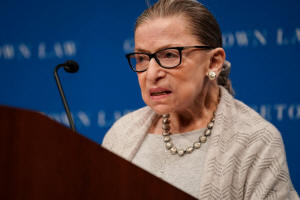A transformed US Supreme Court pays tribute to Justice Ginsburg
 Send a link to a friend
Send a link to a friend
 [March 18, 2023]
By Andrew Chung and John Kruzel [March 18, 2023]
By Andrew Chung and John Kruzel
WASHINGTON (Reuters) -The U.S. Supreme Court's current members, joined
by judges, scholars, lawyers and government officials, paid tribute on
Friday to the late Justice Ruth Bader Ginsburg, a liberal icon and
women's rights pioneer whose 2020 death opened the door to the top U.S.
judicial body's transformative rightward shift.
A rare meeting of the Supreme Court Bar, composed of attorneys admitted
to practice law before the court, featured speeches from people who
worked closely with Ginsburg including U.S. Solicitor General Elizabeth
Prelogar, who argues cases for President Joe Biden's administration.
"Her life was a quintessentially American story," Prelogar said. "She
was born to a family of immigrants, and grew up with modest means. She
faced profound adversity and discrimination. Yet, through her intellect,
hard work and force of will, she not only reached the top of her
profession, she reshaped it. She broke barriers for those who came after
her and she inspired multiple generations."

A similar meeting was held following the 2016 death of Justice Antonin
Scalia, whose memory looms large among conservatives just as Ginsburg's
does among liberals. The two jurists were close friends who shared an
affection for opera.
Ginsburg's death at age 87 after a bout with cancer was an inflection
point for the court.
It enabled then-President Donald Trump to make a third appointment to
the court - Amy Coney Barrett - who was rapidly confirmed by a Senate
then controlled by his fellow Republicans. That gave the court a 6-3
conservative majority, further diminishing the power of its liberal bloc
and paving the way for rulings like last year's decision ending the
recognition of a constitutional right to abortion.
Trump also appointed conservative Justices Neil Gorsuch in 2017 and
Brett Kavanaugh in 2018.
The conservative majority has shown no hesitation in taking on
contentious issues, also including last year's ruling widening gun
rights. Based on arguments held since their current term began in
October, the conservative justices appear poised in the coming months to
end affirmative action policies used by colleges and universities to
increase campus racial diversity, further undermine a federal law
barring racial discrimination in voting and enable businesses to refuse
certain services to LGBT people based on constitutional free-speech
rights.
[to top of second column]
|

U.S. Supreme Court Justice Ruth Bader
Ginsburg delivers remarks during a discussion hosted by the
Georgetown University Law Center in Washington, D.C., U.S.,
September 12, 2019. REUTERS/Sarah Silbige

Barrett was confirmed by Senate Republicans a week before the 2020
presidential election. Democrats accused them of hypocrisy after
Republicans refused to act on Democratic President Barack Obama's
nomination of Merrick Garland to succeed Scalia during a
presidential election year in 2016.
Garland, a former appellate judge who now serves as U.S. attorney
general, spoke about Ginsburg at a special sitting of the court
following the bar meeting.
Garland recalled first encountering Ginsburg in 1978 at the Supreme
Court when he was a clerk for Justice William Brennan and she was an
American Civil Liberties Union lawyer delivering an oral argument.
Garland said the justices had told the clerks Ginsburg "was the best
advocate we would hear that term, and she did not disappoint."
Ginsburg was a "brilliant, courageous and principled" advocate and
jurist whose impact on the court and her country "will be felt for
generations to come," Garland added.
Chief Justice John Roberts said Ginsburg "used the law to change our
country profoundly for the better as an advocate prior to becoming a
member of this court." Roberts highlighted Ginsburg's life outside
the law and her unexpected ascent to "rock star" status as a
bespectacled justice-turned-cultural phenomenon dubbed the
"Notorious R.B.G." She even would inspire some little girls to dress
up as her on Halloween, he added.
"Now, to be clear, Ruth absolutely loved every minute of it,"
Roberts said.

She rose from a working class New York City upbringing and prevailed
over the legal profession's systemic sexism to become one of
America's best-known jurists. Appointed to the Supreme Court by
Democratic President Bill Clinton in 1993, Ginsburg provided key
votes in rulings securing equal rights for women, expanding gay
rights and safeguarding abortion rights.
Ginsburg was the second woman ever named to the court. It now for
the first time has four female justices.
(Reporting by Andrew Chung; Editing by Will Dunham)
[© 2023 Thomson Reuters. All rights
reserved.]This material may not be published,
broadcast, rewritten or redistributed.
Thompson Reuters is solely responsible for this content. |